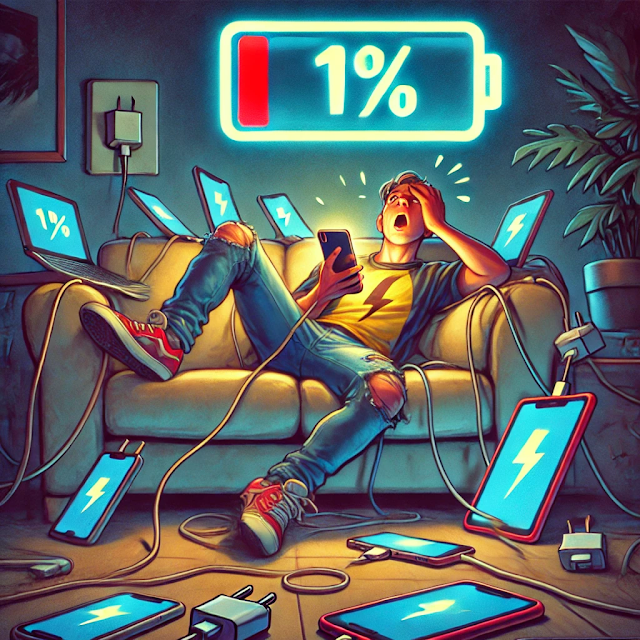Ah, smartphones—the tiny glowing rectangles that simultaneously connect us to the world and chain us to a digital hamster wheel. We carry them everywhere: to bed, to the bathroom, even to the Great Outdoors (you know, just in case a tree falls and we need to Instagram it). But what if our attachment to our phones isn't just an innocent convenience? What if it's a full-blown phobia with a name as ridiculous as its implications—Nomophobia?
For those not in the know, Nomophobia (short for “no mobile phone phobia”) is the anxiety one feels when they can't access their phone. And yes, this is a real thing. It’s not just a quirky BuzzFeed quiz result but an actual, researched phenomenon. The question is: Does Nomophobia actually predict problematic smartphone use? Or is it just a convenient scapegoat for our perpetual scrolling?
What Exactly Is Nomophobia?
Nomophobia is the gnawing dread that arises when your phone's battery drops below 10%, when you realize you've left it at home, or—heaven forbid—when you enter a no-service zone. It’s that existential crisis you feel in an airplane during takeoff, the sheer horror of being offline for an entire hour.
Psychologists describe Nomophobia as a modern anxiety disorder stemming from our over-reliance on mobile technology. Symptoms can include panic, stress, sweating, and, of course, the phantom vibration syndrome—where you feel your phone buzzing in your pocket even when it’s not there. Yes, our brains are now inventing imaginary notifications. Lovely.
Problematic Smartphone Use: When Does It Cross the Line?
Now, before we judge Nomophobia too harshly, let's talk about problematic smartphone use. We all use our phones—a lot. But problematic use is when your phone habits interfere with your daily life. Think missed deadlines, strained relationships, or the inability to get through dinner without doomscrolling.
According to studies, problematic smartphone use shares traits with behavioral addictions. You know, the classics: loss of control, withdrawal symptoms, and continued use despite negative consequences. If your screen time report looks more like a part-time job, you might have a problem.
The Connection: Is Nomophobia the Culprit?
Here’s where things get interesting. Research suggests a strong correlation between Nomophobia and problematic smartphone use. Essentially, the more you fear being without your phone, the more likely you are to develop unhealthy usage habits. It’s like fearing starvation and hoarding 27 bags of potato chips—only in this case, your brain is the chip, and TikTok is eating it.
One study found that individuals with high levels of Nomophobia are more prone to compulsively check their phones, even when there’s no logical reason to do so. It’s not about needing information or connecting with others—it’s about quelling that nagging anxiety. Unfortunately, this often turns into a vicious cycle where the phone use that alleviates anxiety also perpetuates it.
Is It Really a Phobia, Though?
Of course, not everyone agrees that Nomophobia is a legitimate phobia. Traditional phobias involve irrational fears—like spiders, heights, or clowns—where avoidance is a coping mechanism. With Nomophobia, avoidance isn’t really an option unless you want to embrace the life of a modern-day Luddite.
Some experts argue that labeling it a “phobia” is a bit of a cop-out, a fancy way to medicalize what is essentially poor self-control. After all, nobody is calling FOMO (fear of missing out) a medical condition. Maybe we just need a good old-fashioned detox, not a diagnosis.
Are We All Nomophobic Now?
If you’re wondering whether you might have Nomophobia, let me ask you this: When was the last time you turned off your phone? Not just silenced it, but actually powered it down? Do you instinctively reach for your phone the moment you wake up? Do you take it to the bathroom? (Don’t lie, I know you do.)
Chances are, you exhibit at least a mild case of Nomophobia—along with the majority of the population. According to surveys, as many as 66% of people show signs of Nomophobia, and that number jumps to 77% for young adults. The truth is, society is built around our smartphones. Avoiding them isn’t just difficult; it’s borderline impossible.
So, What’s the Solution?
Before you throw your phone into the nearest body of water, remember: moderation is key. While Nomophobia and problematic smartphone use are real issues, they aren’t insurmountable. Setting boundaries, like no-phone zones or digital detox days, can help. There are even apps to limit your phone use—though the irony of using technology to stop using technology is not lost on me.
Therapy and mindfulness practices can also assist in breaking the cycle of anxiety-driven phone use. Understanding why we feel anxious without our phones is the first step to regaining control.
The Final Verdict
So, is problematic smartphone use predicted by Nomophobia? Yes, but not entirely. While Nomophobia certainly contributes to excessive phone use, it's not the sole factor. Habit, boredom, and the sheer addictiveness of digital content all play significant roles.
At the end of the day, our relationship with our smartphones is complicated. They’re part tool, part distraction, part security blanket. Whether we need to blame Nomophobia, technology, or our own lack of willpower, one thing is clear: It’s time to look up from our screens and rejoin the world. Just as soon as I finish this last scroll.
